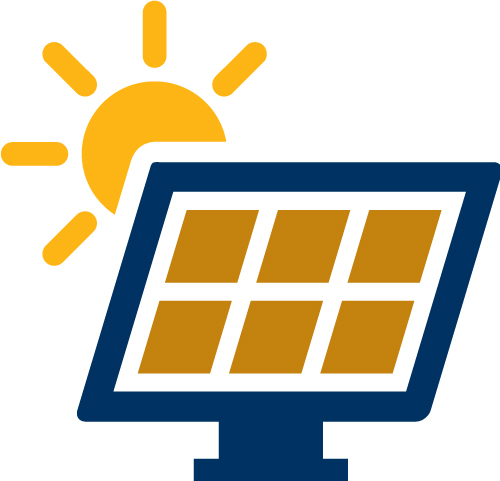Create Your Educational Path in Sustainability Now to Take Advantage of American Jobs Plan

On the 51st anniversary of Earth Day, we are focusing on upcoming job opportunities in the green economy. While it’s still too soon to pin down job specifics of President Biden’s American Jobs Plan, there is support for the type of aggressive domestic investment that this bill promises. Along with that spending comes backing for thousands of well-paying green jobs—ones that you can prepare for by investing in your sustainability education now.
Transportation
One of the proposals in the plan is a $174 billion investment in electric vehicle (EV) infrastructure that includes 500,000 new charging stations and the replacement and electrification of the federal vehicle fleet.
Although the Green Jobs section on the Bureau of Labor Statistics site was an unfortunate victim of budget cuts in 2013, there is still a lot of valuable information that you can glean there. This well-developed article on Careers in Electric Vehicles lays out the span of jobs in this nascent industry. “Employment growth is expected in most occupations in the electric vehicle industry in the next few years according to a study by the Center for Entrepreneurship and Technology at the University of California, Berkeley,” the article states. “Growth is expected in manufacturing industries and the domestic energy sector as the need for batteries and charging stations increase.”
But it’s not all unrestrained growth in the electric-vehicle industry. This recent report from McKinsey details how the industry has slowed in 2019–2020. It is important to investigate a bit further into the reasons for this flattening of the growth curve. One key factor was the phaseout of the federal tax credit for purchasing Tesla vehicles.
It’s all a bit complicated because there are other manufacturers for which there are still tax credits. Luckily, Edmunds has published an updated list on what you need to know about Electric Vehicle Tax Credits.
This current slowdown in demand seems to be a temporary response to the decrease in federal tax credits and even supply—Tesla is selling more models internationally and consequently has fewer units to sell domestically. BloombergNEF sees a dramatic rise in EV share of total car sales in its Electric Vehicle Outlook 2020 report.
(2.7% in 2020 rising to 10% in 2025 and achieving 58% of sales in 2040.)
There are, of course, still a wide variety of jobs in this industry right now. A look at LinkedIn job listings shows that breadth:
These are just some of the job areas that are reflected in the electric car industry. You don’t need to be a Tesla mechanic to take advantage of growth in this industry!
Utilities

Biden’s infrastructure plan includes several green components related to utilities, including $100 billion for high-speed broadband expansion, $100 billion to increase and maintain the electric grid and encourage clean energy production, and $35 billion to fund the Clean Energy and Sustainability Accelerator.
With the catastrophic failure of the Texas electricity grid in early 2021, power grids have been at the top of the news cycle. There are calls to make the U.S. power grid more flexible to adapt to more extreme weather events due to ongoing climate change. One component of that upgrade occurs as the energy is delivered to households: smart grids. The U.S. Department of Energy has produced a thorough explanation of smart grids on its website, where it lists this basic explanation: “Like the internet, the smart grid will consist of controls, computers, automation, and new technologies and equipment working together, but in this case, these technologies will work with the electrical grid to respond digitally to our quickly changing electric demand.”
(Podcast fans might want to listen to Grid Talk, a regular feature on power grid issues sponsored by the Department of Energy.)
You can get an introduction to this field through a series of courses that Extension offers:
- Smart Grids: Introduction
- Smart Grids: Energy-Efficient Buildings
- Smart Grids: Metering and Home Networks
Broadband
Broadband expansion has long been a goal for the federal government, as the digital divide has persisted from the beginning of the internet through its widespread use and into today’s connected environments.
The Pew Research Center has an easy-to-grasp fact sheet on adoption of broadband over the past 20 years, with 77 percent of U.S. adults having broadband access at home.

As the Pew Research shows, however, rural adoption has lagged that of urban and suburban areas. With increased investment in ensuring that everyone in America has access to broadband, expect to see more available jobs in rural areas if Biden’s plan is approved.
For right now, you can see the types of jobs available at a job board hosted by the NTCA—The Rural Broadband Association. Jobs posted here range from technicians to accountants to programmers.
Here are some certificate programs that can help you prepare for careers in demand:
- Program in Software Development
- Professional Sequence in Semiconductor Technology Fundamentals
- Professional Program in IC Semiconductor Design
- Professional Program in Data Administration and Management
Electric Grid

In this U.S. Department of Energy 2006 report, Workforce Trends in the Electric Utility Industry, Baby Boomers who are retiring will have a significant effect on the industry. “For electric utilities, whose service quality and reliability depends on maintaining an adequate, knowledgeable workforce, managing the upcoming retirement transition is a particular challenge.”
Couple that employment gap with Biden’s infrastructure plan, which sets an ambitious goal of a 100 percent-green electricity grid by 2035. Clearly, there will be plenty of jobs in this sector.
Perhaps as an additional inducement, a recent article in BloombergQuint states that “the availability of cheap, emissions-free electricity would set off ripple effects throughout the economy, bringing within reach other solutions that once seemed impracticable.”
- This Forbes article details a sharp uptick in solar jobs available, even before the potential impact of Biden’s infrastructure plan investments in the industry.
- The Biden administration has set a target to deploy 30 gigawatts of offshore wind power that “will trigger more than $12 billion per year in capital investment in projects on both U.S. coasts; create tens of thousands of good-paying, union jobs, with more than 44,000 workers employed in offshore wind by 2030; and nearly 33,000 additional jobs in communities supported by offshore wind activity.”
Steps You Can Take Now
While the renewable-energy and transportation job market is currently robust, the American Jobs Plan looks to continue and accelerate that trend.
Now is the time to invest in your education to prepare for the future of green work.
Add sustainability skills to your toolkit. Our Advanced Program in Sustainable Management gives you foundational knowledge in a range of topics that can help you compete for jobs in the green economy.
Hear from program graduates and instructors who have succeeded in sustainability.